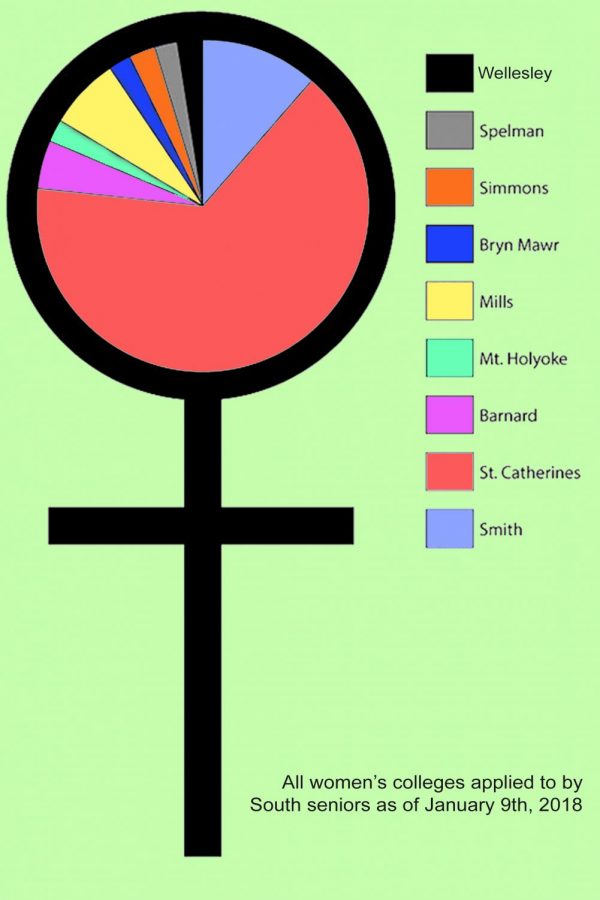All-women’s colleges: “they’re still important”
March 26, 2018
Women’s colleges have existed for hundreds of years, and their purpose has changed over time. Nneka Abdullah, who works in the College and Career Center, explained that women’s colleges exist because “in the past, that was the only option for women, to go to all-women’s colleges… now, they’re still important for women to go to. They’re just another place to educate women.”
Abdullah believes that all-women’s colleges can be very beneficial for certain people. “A certain type of student will apply to an all-women’s college. Some people don’t apply because they think it’s gonna be all women, it’s gonna be drama, and all that but it’s actually the opposite. A woman who is the total opposite of that is gonna be the person to apply.”
Senior Idman Ibrahim is applying to St. Catherine University, an all-women’s college in St Paul, Minnesota. “I know that for me when there’s more women I feel [more] comfortable,” Ibrahim said.
“I encourage women to go to all-women’s colleges…because at an all-women’s college some of the things that I’ve come across is that it’s a supportive environment,” Abdullah said. “Women who go to women’s colleges have more opportunities for leadership in male dominated fields…girls that are interested in pursuing that type of career path or lifestyle, that’s who I would suggest to go.” According to the American Society for Engineering Education, in 2014 80.1% of bachelor’s degrees went to males while only 19.9% went to females.
Kasch Meier, a South alum, is a trans man and is currently attending Smith College. Meier will be graduating this year. Over an email interview, Meier explained that: “Even when I was first applying to Smith, I knew that I didn’t necessarily identify as female or as a woman. However, I felt that Smith could be a place that I could benefit from, and I knew that I had a lot to offer Smith as well.”
Attending an all women’s college, as a trans man, is complicated. “As an institution, Smith College hasn’t done much to accommodate students who don’t identify as female. Smith continues to use female pronouns on all documents and website material,” explained Kasch. “There are few trainings available for professors and staff, and many students push against the idea of allowing non-binary and transmasculine people to attend Smith.”
Despite the difficulty transgender students face while attending all women’s colleges, Meier does not believe this is a new issue. “In all likelihood, trans people have always attended women’s colleges, and we always will attend these colleges. I believe that women’s colleges – or traditionally women’s colleges, as I refer to them – offer a safe, empowering, and unique environment for women, trans people, and people of all genders to receive an education and feel supported.”
Meier does not believe that the faculty at Smith isn’t aware of the fact that transgender students attend all-women’s colleges. “I think that the people in charge of creating materials to advertise Smith College are well aware of the fact that many students are not women and don’t use she/her pronouns. It’s up to the staff and decision-makers of the college to recognize that trans and gender non-conforming students at Smith are important members of the community.”
Meier is optimistic about changes that will come in the future and changes that have already occurred. “Smith only recently started accepting trans women (who may or may not have legally changed their birth certificates/identification documents). Last year the wellness center started a support group for trans-identified students. As of recently, you may request to have a different name (than your legal name) read out loud at graduation. Additionally, I have been able to find an incredible queer, trans, and non-binary community at Smith. I’m thankful for the solidarity that I have found among my trans peers.”
Abdullah believes that overall, there are very few downsides for attending an all-women’s college. “If you like the co-ed atmosphere where there’s both guys and girls on campus [or] if you like male sports, that might be a downside…that would depend [whether] the person going to the college…would even consider that [as] a downside.”
Ibrahim believes traditionally all-women’s colleges will get more popular because “you have all these other colleges that mix women and men so some [people] are saying ‘oh I just want to know what it feels like being at an only women’s college.’”
While all-women’s colleges aren’t perfect, they still have a lot of upsides. They may not suit everyone, but they can advance the careers of some students further than a co-educational college could. All-women’s colleges help provide a space that puts women first and helps them get into leadership roles that they normally may have difficulty accessing.






